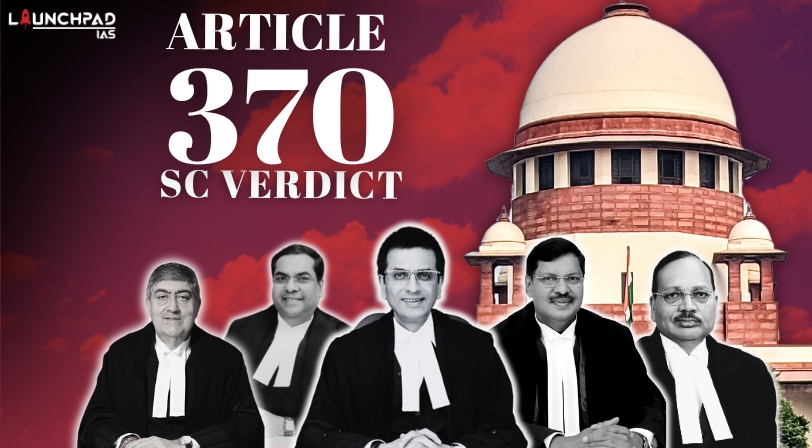Recent Context:
The Supreme Court gave its verdict on Article 370. A constitutional bench headed by DY Chandrachud upheld the decision of the president to abrogate the special status conferred to the erstwhile State of Jammu and Kashmir. The court upheld the constitutional order that revoked Article 370 as valid.
The Bench was headed by DY Chandrachud along with Justice SK Kaul, Sanjeev Khanna, B.R. Gavai, and Surya Kant.
According to the verdict, there was no prima facie case that the president’s 2019 orders were mala fide (in bad faith) or extraneous exercise of power.
What was Article 370 of the Indian Constitution?
Article 370 of the Indian Constitution granted special status to J&K. According to this article provisions of the constitution of India did not apply to Jammu and Kashmir state. It also paved the way for J&K to have its constitution.
Why Article 370?
- With the end of the British paramountcy, the State of Jammu and Kashmir (J&K) became independent on 15 August 1947. Initially, its ruler, Maharaja Hari Singh, decided not to join India or Pakistan and thereby remain independent.
- On 20 October 1947, the Azad Kashmir Forces supported by the Pakistan army attacked the frontiers of the state. Under this unusual and extraordinary political circumstance, the ruler of the state decided to accede the state to India.
- Accordingly, the ‘Instrument of Accession of Jammu and Kashmir to India’ was signed by Pandit Jawaharlal Nehru and Maharaja Hari Singh on 26 October 1947.
- Under this, the state surrendered only three subjects (defence, external affairs, and communications) to the Dominion of India. At that time, the Government of India committed that ‘the people of this state, through their own Constituent Assembly, would determine the Internal Constitution of this state and the nature and extent of the jurisdiction of the Union of India over the state, and until the decision of the Constituent Assembly of the State. The Constitution of India could only provide an interim arrangement regarding the state.
- In pursuance of this commitment, Article 370 was incorporated into the Constitution of India. It clearly states that the provisions concerning the State of J&K are only temporary and not permanent. It became operative on 17 November 1952.
What did the Supreme Court say in its verdict?
- J&K did not have any “internal sovereignty” different from other states and its status under Article 370 is only a form of Asymmetric federation.
- From a Historical Context, it is clear that Article 370 is only a temporary provision.
- President in the exercise of power under Article 370(3) can unilaterally issue a notification that Article 370 ceases to exist.
- The dissolution of the Constituent Assembly did not impact the president’s authority to declare it inoperative.
- It also held that the declaration of state emerging under Article 356 and subsequent actions of the President should have a reasonable Nexus.
- Justice SK Kaul recommended setting up an impartial truth and reconciliation commission to investigate and report on the violation of human rights perpetrated by both state and non-state actors in J&K since the 1980s and recommended measures for reconciliation.
- SC also directed the election commission of India to hold an assembly election in Jammu and Kashmir by September 30, 2024 and also asked the Central Govt. to restore the statehood of Jammu and Kashmir.
Related Links: Most Important Supreme Court Judgements


